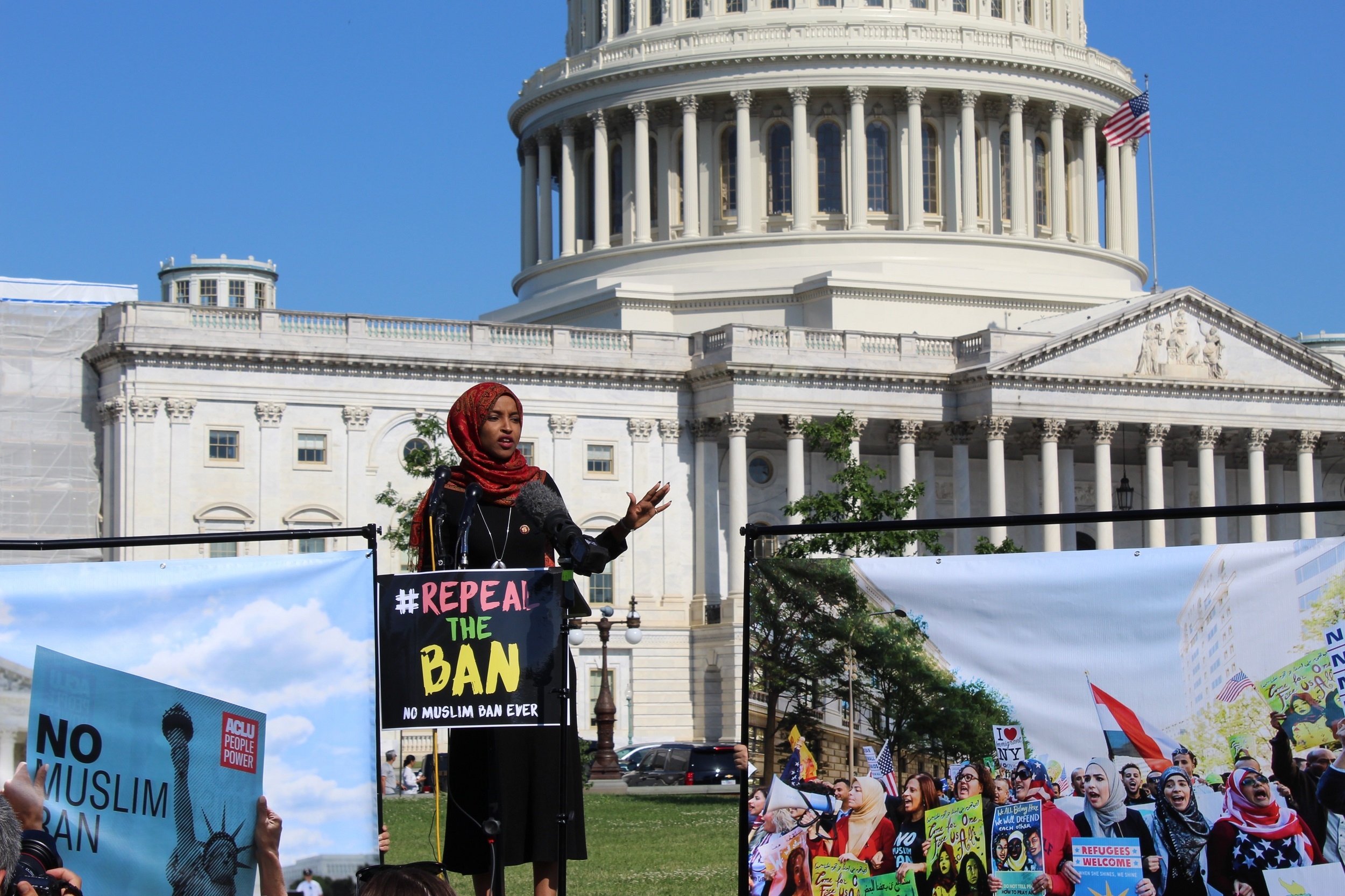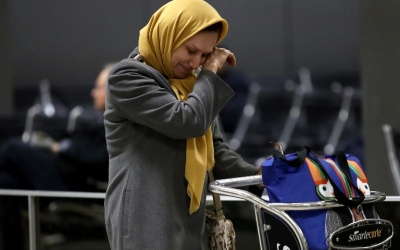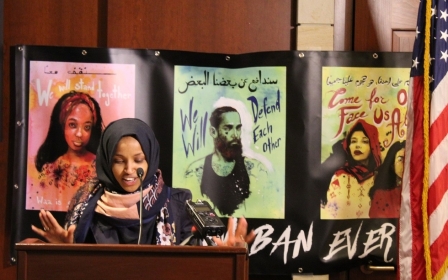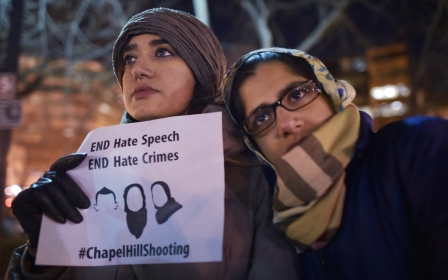Trump's Muslim ban: US lawmakers vow to repeal 'hateful' order

The daughter of Abu Hisham, an elderly Yemeni-American man with a heart condition, was set to get a visa and join the rest of her family in the United States - then Donald Trump enacted his Muslim ban.
Today, she is still waiting for her visa in Djibouti, where many Yemenis have been left stranded as their US immigration paperwork is processed and as war rages in their home country.
Yemeni-American activist Debbie Montaser told the family's story on Wednesday outside the US Capitol building, where Congress members and rights advocates gathered to denounce the Supreme Court's decision to uphold the ban one year ago.
Abu Hisham's daughter missed her own mother's funeral in the US because of a visa delay, Montaser said.
In late 2015, then-candidate Trump called for a "total and complete shutdown on Muslims entering" the United States.
New MEE newsletter: Jerusalem Dispatch
Sign up to get the latest insights and analysis on Israel-Palestine, alongside Turkey Unpacked and other MEE newsletters
Within weeks of taking office in 2017, he signed an executive order imposing a ban on several Muslim-majority countries, including Yemen, Iran, Somalia and Libya.
After several courts blocked various iterations of the ban, the US Supreme Court ruled on 26 June 2018 that the executive order did not violate Muslims' constitutional rights and was within the president's lawful authority.
On Wednesday, Montaser, who co-founded the Yemeni American Merchants Association in New York, said she feels "helpless" when she listens to the painful stories of Abu Hisham and others like him affected by the ban.
"Law-abiding, peace-loving people just want a better life for themselves and their families. And every time I see Abu Hisham, I feel so helpless because I don't know what else we can possibly do," she said.
'Disgraceful'
Despite the Supreme Court's decision, American legislators have pledged to fight the ban.
Judy Chu, a Democrat from California who has introduced several bills to reverse the executive order, said lawmakers have a responsibility to end the "hateful Muslim ban".
"I hear stories everyday from Americans reaching out to tell me they are unable to see their spouse for years, and the one constant is how sad and worried they are for their partner," Chu said.
"Marriage is supposed to be, 'till death do us part' - not 'till Donald Trump do us part'."
For his part, Senator Chris Van Hollen, who has also sponsored measures against the ban, called the Supreme Court's decision to uphold it "disgraceful".
"We're a country that's based on religious freedom, religious liberty, the idea that people could come to this country from all over the world - different backgrounds, different races, different ethnicities, different religions," Van Hollen said.
"The court's decision put a dagger into that idea."
While several lawmakers portrayed the ban as an un-American "stain" on US history, one speaker at Wednesday's event said Trump's executive order fits into the systematic use of immigration laws to uphold "white supremacy" in the country over the past 200 years.
Almost a century ago, Congress passed the Immigration Act of 1917, which restricted immigration from much of Southeast Asia and the Middle East. Before that, the Chinese Exclusion Act of 1882 imposed a blanket ban on immigrants from China.
'Marriage is supposed to be, 'till death do us part' not 'till Donald Trump do us part''
- Judy Chu, congresswoman
"It is really important that not only we continue the fight to get rid of this ban, but also with it, the larger legacy of white supremacy and xenophobia in the country," said Darakshan Raja, co-director and founder of Justice for Muslims Collective, a US advocacy group.
Raja later told Middle East Eye that it is crucial not to paint a rosy, "ahistorical" picture of the country.
"It's important to remember that history," Raja said, "because in that history also there is a history of resilience and how people fought back."
She added that activists did not defeat discriminatory immigration policies through the courts in the past, but by building "mass movements" that enabled "historical and cultural shifts" that forced those racist laws to be overturned.
Real consequences
On Wednesday, advocates stressed that the executive order is not merely political rhetoric.
Instead, it has "devastating" consequences on people across the country, said Congresswoman Ilhan Omar. Mothers can't see their children, family members can't attend their relatives' weddings and students are deprived of educational opportunities.
"I also think a lot about the little Ilhans who are lingering in refugee camps, who are now realising that this particular Muslim ban is also being applied within our refugee policies," said Omar, who is of Somali and Yemeni descent and came to the US as a refugee herself.
Partly as a result of the executive order, the number of refugees resettled in the US from Muslim countries fell by 91 percent last year compared with 2017.
'I also think a lot about the little Ilhans who are lingering in refugee camps'
- Ilhan Omar, congresswoman
Omar went on to lambast Trump without saying his name, encouraging efforts to repeal the ban.
"We are here to say, in this country we are no longer going to stand for a xenophobic tyrant to continuously rain terror on our communities," she said.
Lawmakers are pursuing several legislative paths to counter the ban.
That includes a bill to withhold funding for its enforcement and one that would amend the law on which it is based - and thereby block its implementation.
Still, with Trump's Republican Party firmly in control of the US Senate, these measures have little chance of passing.
Manar Waheed, senior counsel at the American Civil Liberties Union (ACLU), said the executive branch that signed the order can also undo it.
But she noted that "only a handful" of Democratic presidential candidates have committed to ending the ban on their first day in office - if they are elected in 2020.
Coincidentally, those Democratic contenders will compete in the party's first presidential debate on Wednesday and Thursday.
"Don't let them get away with not acknowledging this day and making a commitment," Waheed said.
Middle East Eye delivers independent and unrivalled coverage and analysis of the Middle East, North Africa and beyond. To learn more about republishing this content and the associated fees, please fill out this form. More about MEE can be found here.





